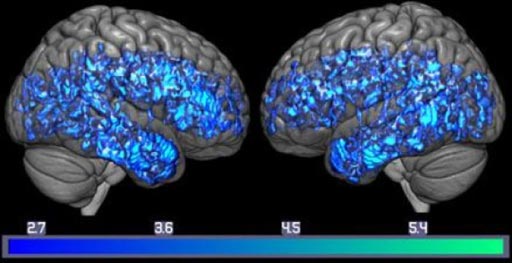Low Serotonin Levels Responsible for Cognitive Decline
By MedImaging International staff writers
Posted on 23 Aug 2017
New research suggests that serotonin loss may be a key player in cognitive decline in Alzheimer and dementia patients, rather than only a side effect.Posted on 23 Aug 2017
The researchers used Positron Emission Tomography (PET) scans of the brain to study the levels of a serotonin transporter in people with mild cognitive problems.

Image: A brain with a decrease of serotonin transporters (blue) for the whole mild cognitive impairment group, and a brain scan of the whole healthy control group (Photo courtesy of the Gwenn Smith Lab).
The researchers from the Johns Hopkins University School of Medicine published the study in the September 2017 issue of the journal Neurobiology of Disease. The researchers also concluded that preventing serotonin loss, or using a substitute neurotransmitter, could stop, or slow the progression of Alzheimer's disease, and maybe even other dementias.
The study included 28 participants with mild cognitive impairment, and 28 healthy matched controls. The participants were aged 66 on average, and included about 45% women. All participants underwent a Magnetic Resonance Imaging (MRI), and a PET scan, in order to measure brain structures, and the levels of the serotonin transporter in the brain. The researchers compared the brain imaging results for the serotonin transporter to two memory tests, and found that lower levels of the serotonin transporters correlated with lower scores in the tests.
Psychiatry and behavioral sciences professor, Gwenn Smith, PhD, Johns Hopkins University School of Medicine, said, "Now that we have more evidence that serotonin is a chemical that appears affected early in cognitive decline, we suspect that increasing serotonin function in the brain could prevent memory loss from getting worse and slow disease progression."
Related Links:
Johns Hopkins University School of Medicine














